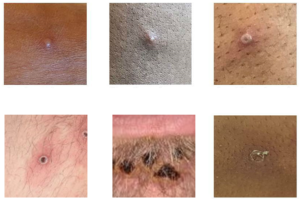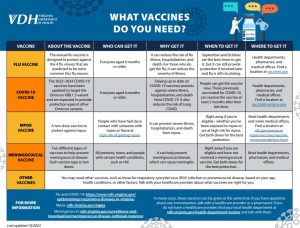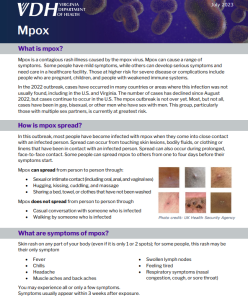About Mpox
Mpox is a contagious rash illness caused by the mpox virus. It's primarily spread by close personal contact with someone who has mpox, including sexual and intimate contact. The virus can also spread from animals to people.
There are two types of the mpox virus: clade I and clade II. Clade I mpox spreads more easily and historically has caused more severe illness and deaths than clade II mpox. Recent data show that clade I infections in the current outbreak may not be as severe as in previous outbreaks.
Mpox Outbreaks
Since 2022, there has been an outbreak of mpox in areas where mpox was not commonly seen. This includes Europe, Canada, and the United States, including Virginia. This outbreak is caused by clade II.
The large ongoing outbreak in the Central and Eastern Africa is caused by clade I.
- On August 14, 2024, the World Health Organization (WHO) declared mpox to be a public health emergency of international concern. The declaration is WHO’s highest level of alert for countries around the world.
- On August 15, 2024, the first clade I mpox case reported outside of Africa was in Sweden. Since then, other countries have reported clade I cases.
- On November 16, 2024, CDC and the California Department of Public Health announced the first known clade I mpox case in the U.S. The patient had recently traveled from Eastern Africa where there is an ongoing clade I mpox outbreak.
- The risk of clade I mpox to the public in the U.S. remains low.
Symptoms of Mpox
The rash can look like pimples or blisters. It can appear on the hands, feet, chest, face, genitals, in and around the mouth, or perianal area. The perianal area is near the penis, testicles, labia, vagina, and anus. It can sometimes be confused with more common sexually transmitted infections (STI), like herpes or syphilis.
The rash might develop on only one part of the body or can appear on many parts of the body. The rash might be painful or itchy.
For some people, a rash may be their only symptom.

Photo credit: UK Health Security Agency
Other mpox symptoms can happen before or after you get a rash. These include:
- Fever or chills
- Headache
- Muscle aches and backache
- Tiredness
- Respiratory symptoms (e.g., sore throat, nasal congestion, or cough)
- Swollen lymph nodes
Mpox symptoms usually start within 3 weeks of exposure to the virus and are usually mild but can be severe. People with mpox often get a rash. For some people, the illness starts with flu-like symptoms that begin a few days before a rash appears.
People with certain conditions might be more likely to develop severe illness. People who are more likely to develop severe illness include:
- people with weakened immune systems
- children under 1 year of age
- people with a history of eczema and
- people who are pregnant or breastfeeding.
If you have severe symptoms of mpox or you are at high risk for developing severe mpox symptoms, contact your healthcare provider about possible medical treatment.
The illness lasts 2-4 weeks. If you have a rash, keep it covered and stay away from others until it has healed and a new layer has formed. People with mpox are contagious until all their scabs fall off and a fresh layer of intact skin forms. This can take 2–4 weeks.
How Mpox is Spread
The virus spreads mostly through close, intimate contact with someone who has mpox.
Close contact means touching any of the following of an infected person:
- touching rashes
- touching bodily fluids
- touching the clothing or linens that have touched a sick person's rash or body fluids
Mpox CAN spread from person to person through:
- Sexual or intimate contact (including oral, anal, and vaginal sex)
- Hugging, kissing, cuddling, and massage
- Sharing a bed, towel, clothes, or other personal items that have not been washed
- Prolonged, face-to-face contact.
Mpox does NOT spread from person to person through:
- Walking by someone with mpox
- Casual conversation with someone with mpox
People who engage in close personal contact with an infected person are at highest risk. The highest risk activities are intimate or sexual contact. Reducing or avoiding these activities lowers your risk of catching or spreading mpox.
- Most daily activities are relatively low risk. Good health habits like proper handwashing can help reduce the risk and spread of mpox.
- Vaccination is an important tool to prevent the spread of mpox. Avoid or reduce behaviors that increase your risk of exposure if you still need a second dose of vaccine.
- As you prepare to attend events and celebrations, visit the CDC website to see how you can stay healthy.
Infected animals can spread mpox to people. So, it’s possible that people who are infected can spread mpox to animals and they might spread it through close contact. This includes petting, cuddling, hugging, kissing, licking, sharing sleeping areas, and sharing food.
If you have mpox, avoid contact with animals, including pets, domestic animals, and wildlife to prevent spreading the virus.
For more information see CDC's Mpox and Pets website.
Preventing Mpox
- If you're eligible for the mpox vaccine (JYNNEOS), get vaccinated. Be sure to get both doses for the best protection.
- The mpox vaccine is safe and effective at preventing mpox.
- To get vaccinated, contact your local health department, pharmacy, or a healthcare provider. Before booking an appointment, call to make sure they carry the mpox vaccine.
- Even if you are vaccinated, avoid contact with people who have a rash that looks like mpox. CDC has information about prevention for people who are sexually active .
When you are around people with signs and symptoms of mpox (including skin or genital lesions):
- Avoid close contact
- Do not share any of the following items:
- Tableware or other eating utensils
- Clothing
- Bedding
- Towels
- Personal grooming devices
- Materials used in healthcare settings
- Make sure you know which activities may increase your risk of exposure.
- Before traveling, learn where clade I MPXV is currently spreading.
- Visit CDC's webpage to learn how to prevent mpox while traveling.
- Wash your hands often with soap and water or use an alcohol-based hand sanitizer
- Visit the CDC website for more tips on how to prevent spreading mpox to others
If You Were Exposed to Mpox
Get vaccinated as soon as possible after exposure to mpox. The vaccine is most effective when given within four days of your last exposure, but don’t wait longer than 14 days.
Watch for symptoms for 21 days from your last exposure
If you have a new or unexplained rash or other mpox symptoms, see a healthcare provider or call the local health department right away.
- Stay away from other people and avoid sharing items you have used or touched until you see a healthcare provider.
- Before you see a healthcare provider, let them know you may have mpox. Make sure to cover all parts of the rash with clothing, gloves, or bandages, wear a mask.
- Do not touch or scratch the rash. This can spread the rash to other parts of your body.
If You're Sick
- Medical treatments are not recommended for everyone who has symptoms of mpox.
- Over-the-counter (OTC) medicines can help to ease your symptoms. See below for some examples.
- Ask your provider or pharmacist for help choosing OTC medicines. Read and follow all instructions on the medicine box and package insert.
General Treatment
- Stay hydrated. Drink plenty of water and other fluids, especially if you have diarrhea.
- Wash your hands often.
- Keep rash and sores clean and dry to prevent the sores from becoming infected.
- Try not to touch, scratch, or shave the rash to prevent spreading the virus to others. Don't lance (pop) or scratch lesions from the rash.
- Visit the American Academy for Dermatology’s (AAD) information sheet for tips on taking care of your skin.
Treatment for Pain and Itching
- Medicines such as ibuprofen and acetaminophen can help reduce pain, swelling, and fever. It is important to follow the recommended dosage and interval for each medicine.
- Advil and Motrin are brand names for ibuprofen.
- Tylenol is the brand name for acetaminophen.
- Antihistamines (such as Benadryl), calamine lotion, petroleum jelly, and cooling lotions can provide temporary itch relief.
- Warm oatmeal baths or sitz bath can reduce itching and pain.
- Dibucaine ointment or lidocaine gel may also provide temporary relief. These are for external use only.
- Take docusate (such as Colace), a stool softener, to reduce pain when you go to the bathroom.
Treatment for Mouth Sores
- Rinse your mouth with clean salt water at least four times per day to keep mouth sores clean. You can also use a mouthwash with no alcohol (such as Listerine Zero Alcohol).
- Suck on ice chips or ice pops and drink water to stay hydrated.
- Use patches that cover the sores and benzocaine gels to reduce mouth pain.
Learn more about taking care of yourself when you have mpox on CDC's website.
If you think you have mpox, see a healthcare provider right away. They can examine your symptoms and help decide if you need a vaccine or test.
If you are diagnosed with mpox, they can help you manage your illness and prescribe treatment if needed. The type of treatment will depend on how severe your symptoms are or if you’re at risk to get severely ill.
- Those at high risk of severe mpox may need prescription treatment, TPOXX (tecovirimat). These people include:
-
- You have a weakened immune system (such as people with HIV that is not well controlled)
- You are more likely to get severe symptoms of mpox (such as people with certain skin conditions, children, or people who are pregnant or lactating)
- You have severe mpox symptoms like:
- Bleeding or infected sores or rash
- Lesions that have turned into larger lesions
- Any condition that requires hospitalization
-
- TPOXX requires a prescription through a health department or CDC. There is no cost to receive TPOXX.
- If you do not have a healthcare provider, you can contact a public health clinic. You can use these resources to find a public health clinic:
- Learn more about mpox treatment on the CDC webpage.
- Stay home (isolate) away from people and animals until your mpox rash has healed and a new layer of skin has formed
- If you need to be around others, keep rashes covered and wear a mask until all symptoms have resolved
- Do not share any of the following with others:
- Tableware or other eating utensils
- Clothing
- Bedding
- Towels or
- Personal grooming devices
- Avoid contact with animals, including pets, domestic animals, and wildlife to prevent spreading the virus.
- Learn more about preventing spread when you have mpox on CDC’s website.
If you have been diagnosed with mpox, your close contacts that they may have been exposed to mpox as soon as possible. This will help make sure they watch for signs and symptoms, get vaccinated to help prevent getting mpox, and get care and isolate if they develop symptoms.
Opens pdf to download
Opens document to download
Opens in a new window
External link will open in a new window. Click link to exit Virginia Department of Health Website.




